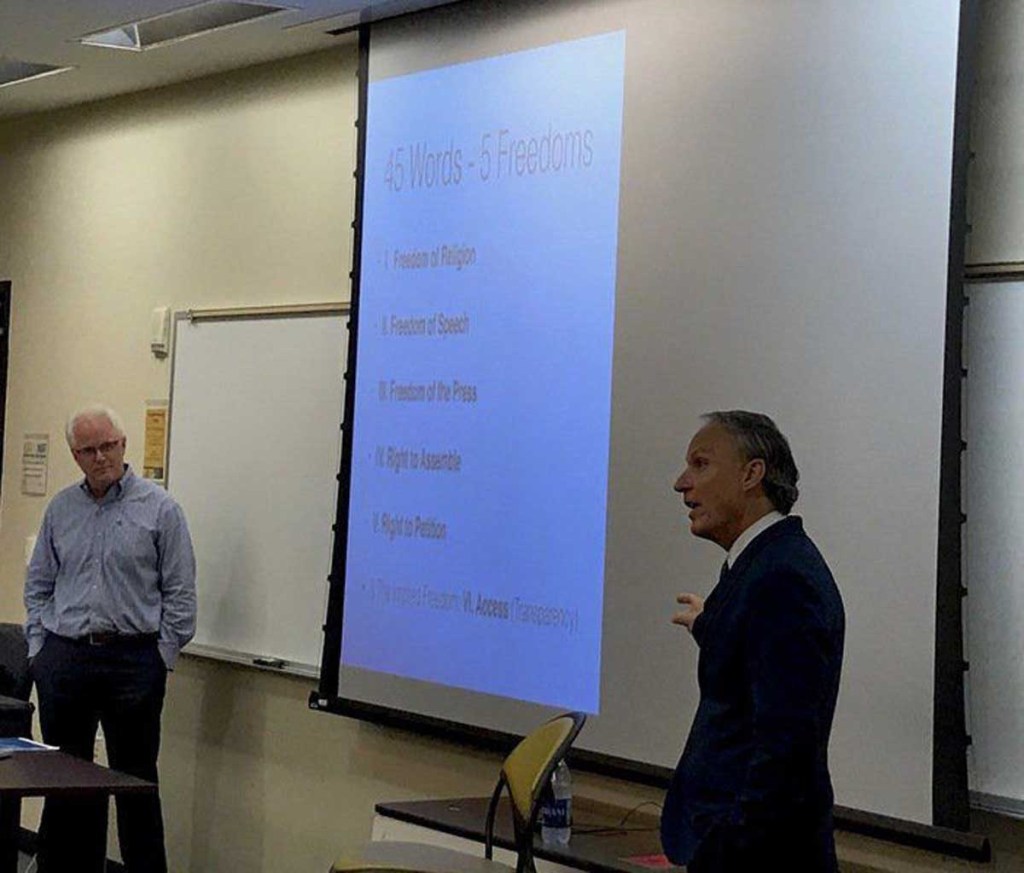Braves deal sparks interest in open government
Published 9:00 am Wednesday, June 28, 2017

- Jill Nolin | The Valdosta Daily TimesJim Zachary, who is a regional editor with CNHI and editor of The Valdosta Daily Times, talks about the state’s Open Meetings Act at a recent government transparency workshop held in Cobb County. Ken Foskett, investigative editor with the Atlanta Journal-Constitution, also talked about accessing public records.
KENNESAW – Sharon J. Hill says she wasn’t necessarily opposed to the deal Cobb County officials struck with the Atlanta Braves to lure the team away from Atlanta.
What she objected to was the way the agreement took shape behind closed doors.
Commission members were briefed privately in small groups on the proposal as a way to share information with them quickly and outside the public sphere, even though taxpayers will pay hundreds of millions of dollars on the project.
That prompted the creation of the Citizens for Governmental Transparency, of which Hill is a member. It’s a coalition of groups as disparate as the local Tea Party and a local Democratic organization.
“People are standing up. We’re taking back our government,” Hill said, noting that the commission chairman who spearheaded the deal was voted out of office last summer.
Hill was one of dozens who attended a government transparency workshop held at Kennesaw State University on Monday evening in hopes of sharpening their skills accessing public records and navigating the state’s Open Meetings Act.
The workshop was organized by the Society of Professional Journalists and the Georgia First Amendment Foundation, which is a nonprofit that advocates for preserving and expanding the public’s rights to free speech and government access.
The event was held there at the request of Lisa Cupid, a commissioner in Cobb County and the lone dissenting vote on the Braves plans in 2013. Cupid, who was in her first year in office at the time, tried to delay the vote so the proposal could be examined more fully.
She said it’s important for residents to know “their parameters of engagement,” which in turn makes elected officials “better stewards of the public trust.”
“You don’t know what you don’t know,” she said. “Government is for those who are governed by it, but it’s easy to feel as if the converse of that is true and that those who govern it are the ones who own government.”
Violations of the state’s Open Meetings Act likely “happen all the time in every part of Georgia,” said Jim Zachary, who is a regional editor with CNHI and editor of The Valdosta Daily Times.
For example, Zachary described how a board might go into executive session for a reason allowed under state law – such as to discuss a personnel issue – but the conversation can stray off topic if officials are not committed to addressing only the specific matter that brought them behind closed doors in the first place.
In South Georgia, a hospital authority violated the Open Meetings Act by holding unannounced closed-door meetings ahead of their advertised public meeting.
The record of compliance with the state’s sunshine laws is also spotty when it comes to public documents, said Ken Foskett, investigative editor with the Atlanta Journal-Constitution.
“Compliance with the law varies widely across Georgia and across Atlanta,” he said. “It depends on where you live, and that’s unfortunate because it’s the same law everywhere.”
For example, Foskett said a group of student-journalists with the Georgia News Lab recently tested metro Atlanta-area governments by requesting the local policy on use of force.
One sheriff’s office sent its policy in 16 minutes. Some took a couple days. Others responded with the policy after a month or two. Some never responded. State law requires a response within three business days.
Former Georgia attorney general Sam Olens, who spoke at the Monday meeting, said it’s also important for reporters to show up at public meetings, including the tedious work sessions where much of the discussions take place.
“The press pays 90 percent of attention to documents. They pay 10 percent attention to meetings,” said Olens, who is now KSU’s president.
Olens said he thought the current national focus on the press is a “healthy discussion.”
“But at the end of the day, if the press isn’t public, if the press isn’t active, then you really don’t have a good democracy and we really don’t have a vibrant system of government,” he said.
A video of the more than two-hour presentation is available here, courtesy of Nydia Tisdale with AboutForsyth.com.
Jill Nolin covers the Georgia Statehouse for The Valdosta Daily Times and CNHI’s newspapers and websites.





